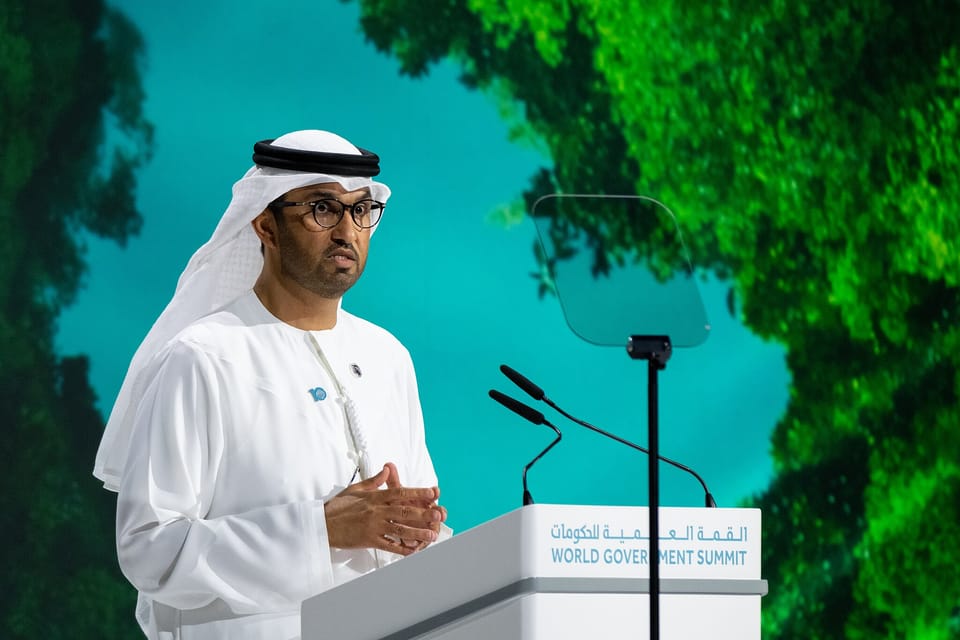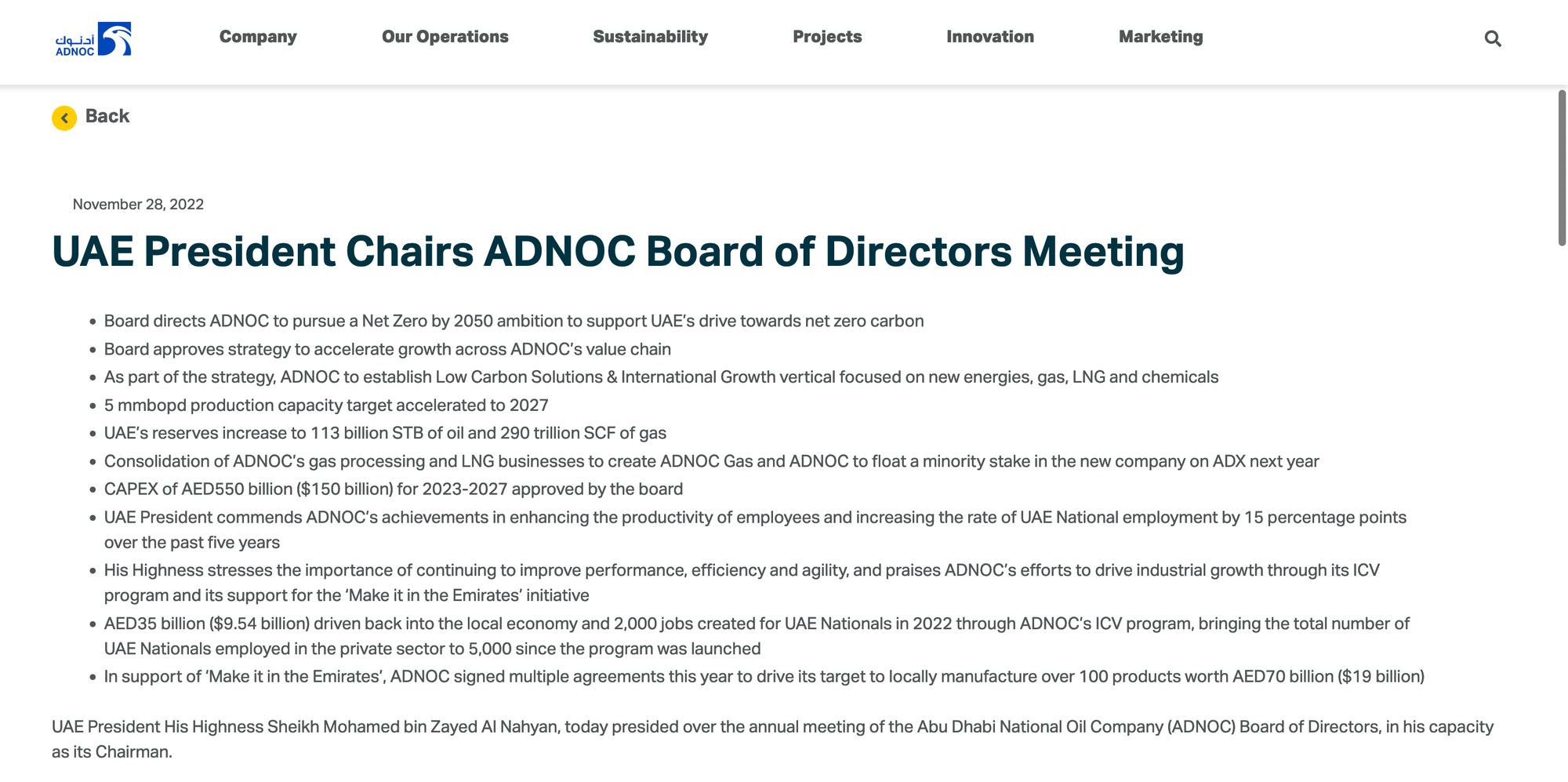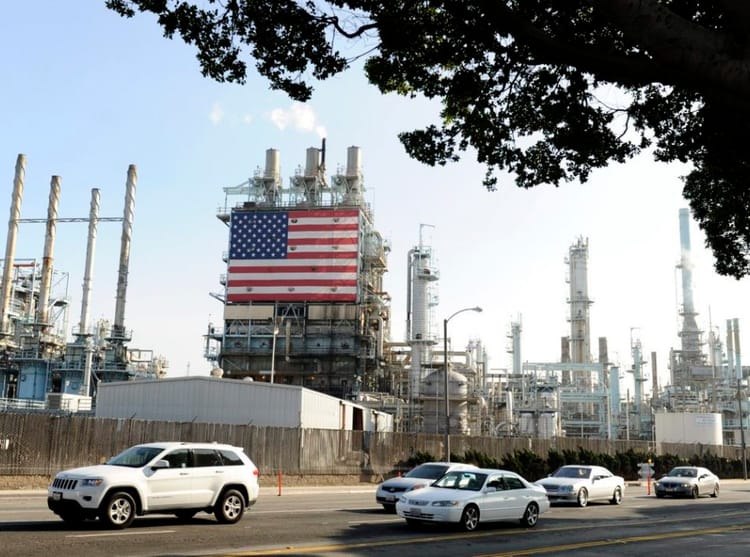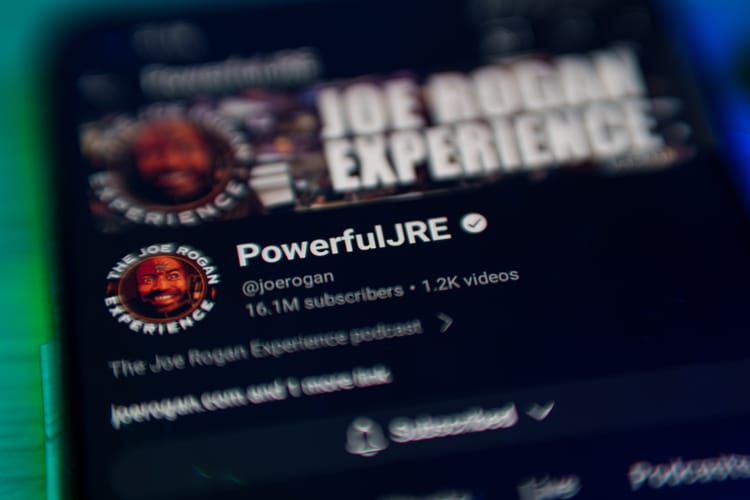Once Again, Al Jaber Tells The World Exactly Who He Is

For the better part of a year, white guys who know things have been telling us to wait and see what Al Jaber actually does at COP28. He's an innovator, they said. A shrewd negotiator. The guy who will bring the fossil fuel industry to heel. Despite the mountain of evidence there is to suggest that Al Jaber is at best a technocrat and more likely a pretty run-of-the-mill oil executive, their belief that he was the man for the job was unshakeable.
Now, there are two more pieces of evidence: His first week on the job at COP and the video of a panel discussion at a women's climate summit during which he shows his entire ass.
Al Jaber's COP is so far exactly what I for one expected to see: lots of big announcements that may or may not result in anything real after the party ends in Dubai, and a whole lot of distraction from the most fundamental point of COP, a blueprint for phasing out fossil fuels. I've talked before about his love of the concept of abated emissions, and overstatements about the capacity of currently available technology, which we've seen more of this week. Lots of folks are excited about the loss and damage commitment, language around phasing out coal in the ever-evolving draft agreement, and about the commitment—once again—from 50 of the world's largest oil and gas companies to do something about methane. Quick thoughts on those:
- Loss and Damage - excellent to get actual money pledged and even more promising to see delegates agree to the mechanisms through which the Loss and Damage fund will work. Less exciting: the low amount of money committed by the U.S.; the fact that the leaders of the world's top emitters (including the U.S., Russia, and China) have not bothered to even attend this COP; the fact that the amount pledged so far pales in comparison to what's needed; and the likelihood of the UAE using its $100 million commitment as proof that it got something done at COP28, all while fighting against a commitment to phase out oil and gas. Also worth noting: world leaders have committed to loss and damage before, in fact more than once, and then reneged on those commitments. And, the role of the World Bank as interim funder is concerning to a whole lot of folks and justifiably so given the organization's track record.
- Coal Phaseout Language - Great to see a commitment to phasing out coal, but not if it's used as an excuse to avoid phasing out oil and gas. For the entirety of COP's existence oil majors have used the tactic of painting coal as the real bad guy; continuing to do so today will put pressure on less developed countries to do things wealthier countries and the companies headquartered in them don't want to do.
- Methane Pledge - Last Saturday, Al Jaber announced that oil companies, including ExxonMobil and Saudi Aramco, have committed to dramatically reducing methane emissions "to near zero by 2030." Okay first, tremendous to see "near zero" instead of "net zero," that's a win. But, as many have pointed out, the best way to stop methane "leaks" is to phase out gas; instead, the U.S., like the UAE, is ramping up gas production. And then there's the fact that, as Environmental Defense Fund president Fred Krupp put it: "Many promises have been made at COPs that have not been kept.” The industry has been committing to do something about methane for years; it's hard to get excited about yet another commitment to voluntary, self-regulated action, although the fact that environmental groups like EDF and Rocky Mountain Institute now have the tech and capacity to track these commitments is a positive step.
The one piece of unequivocally good news coming out of COP so far has nothing to do with Al Jaber: Colombia signed on to the Fossil Fuel Nonproliferation Treaty, the first country with significant fossil fuel resources to do so.
Now on to the tape. I'm going to spend a little more time on this than we usually do in the newsletter because Al Jaber has unintentionally given us an excellent primer on both petromasculinity and the greatest hits of fossil fuel PR.
On November 21, Al Jaber joined a live online event with former Irish president Mary Robinson. The event was public and taped, and published on YouTube, despite The Guardian's description of its recap of the event two weeks later as an "exclusive." Strangely, the headline of the story, which ran December 3rd, focuses on the one thing Al Jaber did not really say in the panel: "Cop28 president says there is ‘no science’ behind demands for phase-out of fossil fuels," it proclaims. But Al Jaber immediately corrected himself in the tape, saying "there's no science, er no scenarios" that demand an absolute phase-out of fossil fuels to hit 1.5. Which might seem like the same thing, but Al Jaber was specifically referring here to the scenarios laid out in reports from the Intergovernmental Panel on Climate Change and...he's not wrong. Also the end of that same sentence is "1.5 is my North Star" and "a phase down and phase out of fossil fuels is inevitable, it is essential." Perhaps more importantly, Al Jaber says plenty of more wild things here, there's no shortage of more straightforward sound bites to choose from!
What really jumped out to me, particularly in the 7 minutes The Guardian embedded in its story, was just how many of the fossil fuel industry's favorite talking points he managed to cram into such a short amount of time. It bears repeating: Al Jaber is in many ways the creation of Global North PR agencies. Edelman, in particular, has worked for 15 years to craft Al Jaber's persona, but man, the student has become the master. Al Jaber has Edelman's fossil fuel talking points down even better than Richard Edelman himself does. They are:
- Pinkwashing - Al Jaber arrives at this panel discussion full of praise for women, and highlighting his and the UAE's commitment to gender equality, and how that commitment extends to COP28. "We have always put the equality of women very high to our development agenda, and it has always been central to everything we do across the country," he said. "And now when it comes to the climate agenda, we all know that women, like others, are affected by the impacts of climate change, and this is particularly true in the Global South, and we know that there is an imbalance that must be addressed if we are seriously and genuinely interested to effectively engage in the mitigation of climate change. That is why we made sure that women, gender equality, youth, and being very inclusive, is a defining principle of what differentiates the agenda of COP28, and it is why we will include special segments on gender and inclusivity throughout the thematic program." About five minutes later, Mary Robinson interrupts him—not overly rudely, mind you. She sort of signals that she wants to say something and then says "Can I just come in here for a moment..." And the entire vibe of the conversation shifts; the mask slips and we get a window into what Al Jaber (and frankly the industry as a whole) really thinks of women.
- Business vs. Climate This is a recurring theme for Al Jaber, both in this talk and with respect to climate in general. As we've documented extensively, his approach to climate solutions is always to look first for the climate solution that can deliver the same level of profit as oil and then for the one that might actually be effective (never mind that his continued development of fossil fuels also serves to undermine the potential profit of any other energy source). This also gets defined as male v. female, something the industry has done broadly for decades. "You are a good politician and you know how to use words better than I do. I'm a businessman, I am centered around delivery and actions," Al Jaber tells Robinson. It's an echo of the message we've been hearing from industry for more than a century: it is reasonable and logical to place economic concerns above all else; it is weak, emotional, and silly to care overly much about nature; nature exists as a resource to be controlled and extracted from for our benefit.
- Development vs. Survival - "Show me a roadmap for a phase out of fossil fuel that will allow for sustainable socio economic development. Unless you want to take the world back into caves," Al Jaber told Robinson. This is another one that is coming up more and more often, the idea that those who want to see the world act on climate are elitists who don't care about the poor, or hippies who are anti-development. We have debunked this idea thoroughly, starting with some basic data: If fossil fuel development were going to solve energy poverty in Africa (where the industry likes to focus its comments), surely that would have happened by now in Nigeria, which has the largest and oldest fossil fuel industry on the continent. Nigeria currently ranks last in the world on energy access.
- Developed Countries Should Take the Lead The industry goes back and forth on this depending on what suits their needs. When faced with the Kyoto Protocol, industry groups like the Global Climate Coalition said it was unfair that developing countries didn't have to deliver the same level of emissions reductions as the rest of the world. "It's not global and it won't work," they said in a TV commercial. Now that they're growing increasingly dependent on not only developing oil and gas reserves in the Global South, but getting as many Global South residents as possible hooked on fossil fuels, the tune has changed entirely. "You can take the lead," Al Jaber told Robinson. "Someone has to take the lead. You come from a developed country. Developed countries, I'm sure can take the lead like they always do. You can lead by example." It echoes a speech Exxon CEO Darren Woods made in San Francisco at around the same time Al Jaber was Zoom-ing with Mary Robinson. "Three billion people fall short of modern living standards, and far too many remain trapped in extreme poverty with no access to electricity or clean cooking fuels. The global North-South divide will only be bridged when we commit to solving the world’s energy and emissions challenges simultaneously."
- Alarmist vs. Factual and Scientific Again, an absolute fave of the industry and its fans at the moment, this idea that those who wish to act on climate are being alarmist and radical while those who wish to continue burning the maximum amount of fossil fuels, knowing that it is speeding up a crisis, are the rational minds in the room (very big gender undertones here as well). "I accepted to come to this meeting to have a sober and a mature conversation," Al Jaber scolds Robinson. "I'm not in any way signing up to any discussion that is alarmist." It's at this point in the conversation that he makes his statement about the science—or lack thereof—behind a complete fossil fuel phaseout and the target of keeping warming at or below 1.5 degrees. "I am here factual and I respect the science and there is no science out there or no scenario out there that says that the phase out of fossil fuel is what's going to achieve 1.5. 1.5 is my North star. And a phase down and a phase out of fossil fuel, in my view, is inevitable. It is essential, but we need to be real, serious, and pragmatic about it."
- Speaking of keeping things factual...directly after this, Robinson mentions that the company Al Jaber runs—the Abu Dhabi National Oil Company, or ADNOC—is increasing its oil and gas production. Al Jaber loses it a bit and accuses her of lying and repeating lies from "your media." Then he references something that's been mentioned in a few outlets, the idea that Adnoc is "doubling" its production, which he says is untrue. Robinson never said those words, though, and what she did say—that ADNOC is increasing production—is something the company has made many announcements about, including this one in which they announce that at a board meeting chaired by the UAE president, the "5 mmbopd production capacity target accelerated to 2027."

- Low-Carbon Oil and Gas A more recent favorite talking point of the industry is this focus on "carbon intensity" and how the longtime players in the industry know how to produce "low carbon" oil and gas. They're referring here to the emissions produced while extracting, refining, and distributing oil and gas—which represent around 10 percent of the emissions associated with fossil fuels—not the major source of emissions, which of course is burning fossil fuels.
- Pointing Fingers Is the Problem Ah yes, the old "accountability is unproductive" story. This is a toxic male narrative that climate guys like to trot as well...fun! Never mind the problem, or the people who caused it; never mind consequences for actions, or understanding where we went wrong so we could maybe avoid taking the same wrong turns over and over again for the next thousand years. Al Jaber really hammers this one home again and again in his conversation with Robinson. "I don't think Mary will be able to help solve the climate problem by pointing fingers or contributing to the polarization and the divide that is already happening in the world," he says. "What we need here is solutions. Show me the solutions. Stop pointing fingers. Show me solutions." As I've written about many times: accountability is a climate solution. In fact it needs to be the first one.
I doubt Edelman, or his former right-hand man Alan VanDermolen, who now runs the COP28 comms team, would have been pleased with Al Jaber losing his temper. The fact that he decided the "SHE Changes Climate" event was the right place to unleash on one of the most respected women in the climate space certainly doesn't mesh with the carefully constructed "progressive technocrat, modern man of the world" persona that Edelman has worked tirelessly to create for Al Jaber over the years. It was unnerving to watch, not least because all three women just sort of sat there and took the scolding, after which the moderator thanked Al Jaber for a "robust, positive exchange." I don't know that any of them trying to match Al Jaber's aggressive tone would have gone over very well, but man what a missed opportunity to delve into the toxicity of petromasculinity.
Nonetheless, we see here, again, that Al Jaber is a PR instrument of the industry he has worked in his entire life (yes, he ran Masdar for a bit, but it was Adnoc that sent him to school and gave him a career). The talking points are inseparable from the man.





